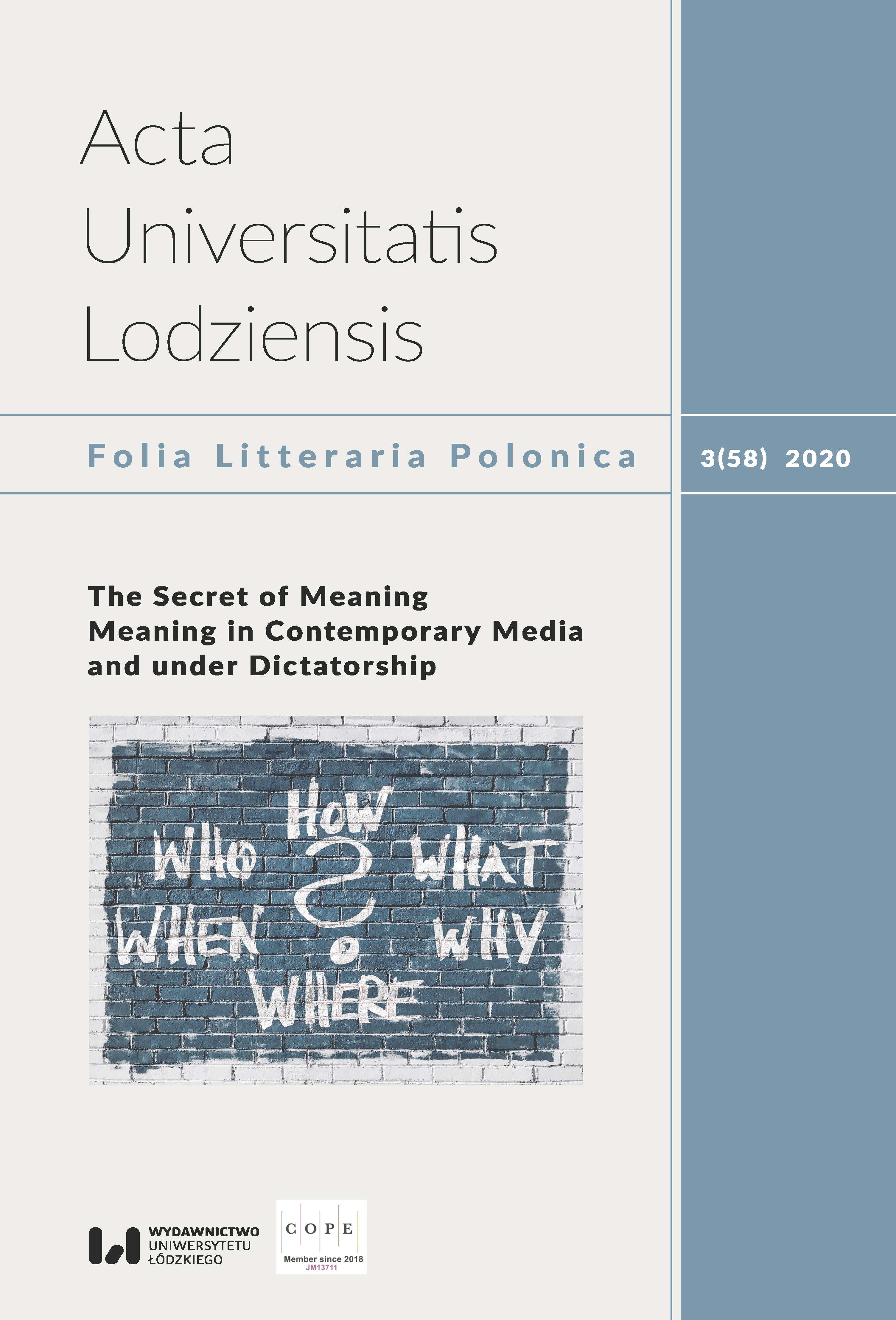Porównanie koncepcji Nowomowy w powieści Rok 1984 George’a Orwella ze sposobem myślenia o języku w powieści Ta ohydna siła C.S. Lewisa
DOI:
https://doi.org/10.18778/1505-9057.58.25Słowa kluczowe:
G. Orwell, C.S. Lewis, totalitaryzm, dehumanizacja, psucie języka, sztuczny język, eksperymentowanie w dziedzinie językaAbstrakt
Celem artykułu jest zbadanie wybranych źródeł inspiracji, które mogły posłużyć G. Orwellowi do stworzenia koncepcji sztucznego języka zwanego Nowomową, który w powieści Rok 1984 ukazany jest jako skuteczne narzędzie zniewolenia i kontrolowania myśli w ręku totalitarnej władzy. Autor omawia w tym kontekście możliwe związki między Nowomową a rzeczywiście istniejącymi sztucznymi językami, takimi jak Esperanto. Wskazane są również podobieństwa i różnice między Orwellowską koncepcją „dwójmyślenia” a pojęciem „ketmanu” zdefiniowanym w książce Czesława Miłosza pt. Zniewolony umysł. Jednak główny nacisk położony jest na związki między powieścią Orwella a fantastyczno-naukową powieścią C.S. Lewisa pod tytułem Ta ohydna siła. Wiadomo, że Orwell książkę Lewisa znał i nawet ją zrecenzował. Istnieje wiele bardziej i mniej oczywistych podobieństw między tymi dwoma wybitnymi wizjami zdegenerowanego języka, który służy bardziej politycznej manipulacji niż wzajemnemu zrozumieniu.
Pobrania
Bibliografia
The Bible. Authorised King James Version, The New Testament, eds. Robert Carroll, Stephen Prickett, Oxford University Press, Oxford 1998.
Google Scholar
Lewis Clive S., That Hideous Strength. A Modern Fairy Tale for Grown-Ups, Harper Collins Publishers, London 2005.
Google Scholar
Milton John, Poetical Works, Oxford University Press, London, Oxford 1974.
Google Scholar
Miłosz Czesław, The Captive Mind, Penguin Classics, London 2001.
Google Scholar
Orwell George, Nineteen Eighty-Four, Penguin Books, London 1990.
Google Scholar
Purtill Richard L., Lord of the Elves and Eldils. Fantasy and Philosophy in C.S. Lewis and J.R.R. Tolkien, Ignatius Press, San Francisco 2006.
Google Scholar
Rohde Erwin, Psyche. Sehlenkult und Unsterblichkeitsglaube der Griechen [Psyche. The cult of the soul and belief in immortality of ancient Greeks], Alfred Kröner Verlag, Stuttgart, no publication date.
Google Scholar
Shakespeare William, Hamlet, ed. Bernard Lott, Longman, Burnt Mill, Harlow, 1993.
Google Scholar
The Shewings of Julian of Norwich, ed. G.R. Crampton, Medieval Institute Publications, Kalamazoo, Michigan 1994.
Google Scholar
Filmer Kath, That Hideous 1984. The Influence of C.S. Lewis “That Hideous Strength” on Orwell’s “Nineteen Eighty Four”, https://online.liverpooluniversitypress.co.uk/doi/abs/10.3828/extr.1985.26.2.160?journalCode=extr [accessed on: 20.04.2018].
Google Scholar
Goryl próbował zaatakować, kiedy dziecko uderzało pięściami w klatkę piersiową, „Gazeta Wyborcza” 2015, 18.04, http://wyborcza.pl/1,75399,17776188,Goryl_probowal_zaatakowac__kiedy_dziecko_uderzalo.html [accessed on: 20.04.2018].
Google Scholar
Noller Jörg, Logik des Scheins. Kant über rationale Selbsttäuschung, https://www.academia.edu/38373262/Logik_des_Scheins_Kant_%C3%BCber_rationale_Selbstt%C3%A4uschung?auto=download [accessed on: 20.04.2018].
Google Scholar
Orwell George, 1984, https://www.planetebook.com/free-ebooks/1984.pdf [accessed on: 20.04.2018].
Google Scholar
Orwell George, Politics and the English Language, https://faculty.washington.edu/rsoder/EDLPS579/HonorsOrwellPoliticsEnglishLanguage.pdf [accessed on: 20.04.2018].
Google Scholar
Orwell George, The Scientists Take Over, George Orwell’s review of C.S. Lewis, That Hideous Strength (1945), http://www.lewisiana.nl/orwell/ [accessed on: 20.04.2018].
Google Scholar
Pool Jonathan, Grofman Bernard, Language as Political Control: Newspeak Revisited, https://old.panlex.org/pubs/etc/langpolcontrol.pdf [accessed on: 20.04.2018].
Google Scholar
Swift Jonathan, Gulliver’s Travels, https://www.gutenberg.org/files/829/829-h/829-h.htm [accessed on: 20.04.2018].
Google Scholar
The Free Dictionary by Farlex, https://www.thefreedictionary.com/dictionary.htm [accessed on: 20.04.2018].
Google Scholar
Wikipedia, https://en.wikipedia.org/wiki/Novial [accessed on: 20.04.2018].
Google Scholar
Wikipedia, http://en.wikipedia.org/wiki/That_Hideous_Strength [accessed on: 20.04.2018].
Google Scholar
Pobrania
Opublikowane
Jak cytować
Numer
Dział
Licencja

Utwór dostępny jest na licencji Creative Commons Uznanie autorstwa – Użycie niekomercyjne – Bez utworów zależnych 4.0 Międzynarodowe.











